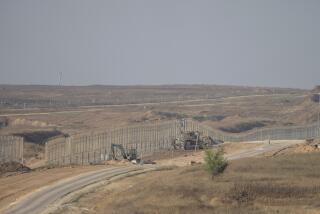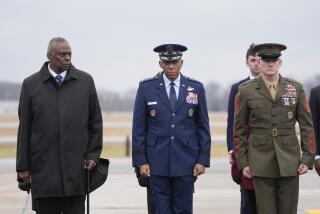Suicide Blasts Kill 13 Across Baghdad
- Share via
BAGHDAD — Suicide car bombers launched eight attacks across Baghdad on Friday, killing at least 13 people and further calling into question U.S. military claims that insurgent suicide cells in the capital had been disrupted by more than a month of targeted operations undertaken with Iraqi forces.
Several of the attacks caused no deaths, but at least one, in the working-class Shaab neighborhood, killed at least eight members of the Iraqi national guard and injured 20 civilians who were in the busy area at noontime.
In Samarra, a city north of Baghdad that has been the site of frequent violence for more than a year, dozens of armed men attacked a U.S. military outpost in the center of town. Fighting continued for two hours, leaving at least one person dead and several injured, witnesses said.
A steady stream of suicide attacks over the last six days has continued to destabilize the Iraqi capital and made some residents wonder whether to fear or welcome Iraqi security forces on their streets because they are so frequently the target of attacks that also kill civilians and destroy businesses.
“This is quite wrong to have the Iraqi national guard and Iraqi police near a residential area,” said Omar Amir, 30, who opened a modern grocery store six months ago just steps from Friday’s deadly bombing in Shaab. Nearby lay four cars, burned and blackened.
“When the Iraqi security installs checkpoints right in front of our shop, we become very frightened because we know they are a magnet for the bombers,” he said.
The Iraqi national guard and police are the two main forces in Iraq’s cities, often running checkpoints and guarding buildings. Both security forces are frequent targets of suicide bombers. The Iraqi army, which is far fewer in number, primarily works with U.S. troops on selected operations.
In the aftermath of the Shaab attack, frightened national guardsmen fired randomly into the air, and several otherwise undamaged cars were left with bullet holes in their windshields.
Of the eight suicide bombings in Baghdad on Friday, two were directed at American military convoys; the others targeted Iraqi security forces and the protection forces for Iraqi President Jalal Talabani, police sources said. Two members of the president’s security force were killed when a suicide bomber detonated his vehicle near their convoy. At least three additional people were killed and dozens more injured in Friday’s attacks.
The U.S. military said two troops were wounded by a suicide bomber in one attack.
The military also announced that two Marines were killed in western Iraq by an improvised explosive device that detonated under their convoy in the Trebil area.
Last week, Maj. Gen. William G. Webster, commander of the Multinational Division in Baghdad, said the military had become better at finding the bombs before suicide attackers detonated them.
“We have also become more experienced in finding these things, because we know pretty much where they’re concentrated in terms of their production,” he said at the time.
During the crackdown on insurgents in Baghdad known as Operation Lightning, the U.S. military, working with Iraqi security forces, had at least halved the number of suicide bombings. “Prior to conducting Operation Lightning, we were experiencing 14 to 21 car bombs a week, and we are now down to about seven to eight a week,” Webster said last week about the crackdown, which began May 22.
The military had success both in disrupting “the cells ... in some cases, they’re less capable of making these things well, and in some cases, we have more experience and more intelligence that allows us to get to them before they get out on the street,” Webster said.
But the rash of attacks Friday -- after a suicide car bombing Wednesday that killed at least 28 people, including 24 children, and another suicide attack Sunday that killed at least 22 people -- raised questions about the long-range effectiveness of the crackdown.
Most of the bombers Friday proved ineffective in hitting their targets. In one case, lives were saved because the suicide driver discovered he was on the wrong side of a median and could not collide with an oncoming convoy of Iraqi national guard trucks. He swerved toward the convoy, attempting to run his car over the median, but it became stuck, detonating in the process.
That incident occurred near an often-targeted hotel that serves as home to members of U.S. and foreign security services as well as private contractors who offer personal security services. The area was peppered with gunfire after the explosion, and Iraqi national guardsmen took up positions in windows and on roofs, disrupting the busy thoroughfare for several hours.
In addition to the Baghdad bombings, attacks Friday included the drive-by shooting of an Iraqi policeman and a civilian with him in a police car in southern Baghdad and a roadside bomb explosion in the Dora neighborhood.
South of Baghdad in Haswa, a suicide car bomb killed five Iraqi soldiers and one civilian and wounded 17 civilians, Associated Press reported. Three Iraqi policemen were killed Friday by gunmen at a checkpoint near Baqubah, northeast of Baghdad, according to AP.
In Kirkuk, a car laden with explosives detonated prematurely, killing the two men in the vehicle and a passerby, AP said.
Five bodies were found in Hayy al Mamel, east of Baghdad. The bodies were disfigured beyond recognition.
Ten bodies had been found in similar condition nearby a few days earlier.
Times staff writers Borzou Daragahi, Suhail Ahmad and Raheem Salman contributed to this report.
More to Read
Sign up for Essential California
The most important California stories and recommendations in your inbox every morning.
You may occasionally receive promotional content from the Los Angeles Times.













